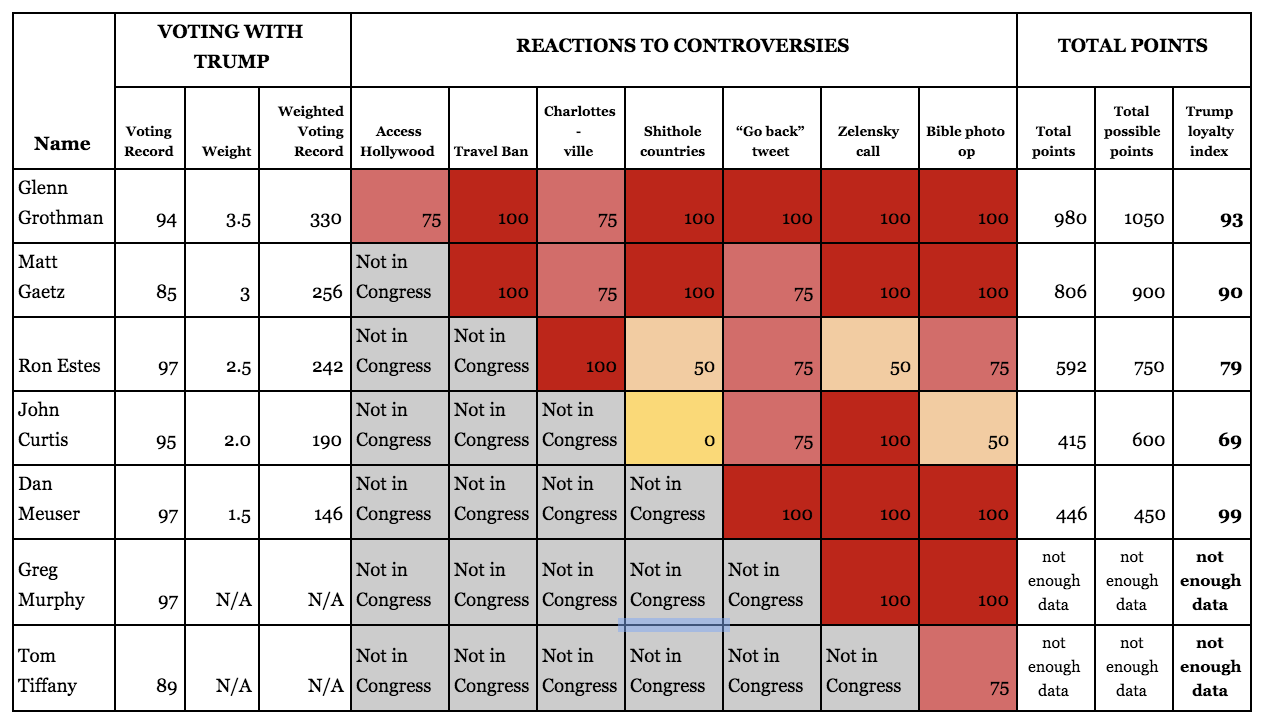The methodology of the Trump Loyalty Index
Add Axios as your preferred source to
see more of our stories on Google.

Photo: Win McNamee/Getty Images
We created the Trump Loyalty Index to measure, in empirical terms, how loyal each Republican member of Congress has been to President Trump throughout his time in office.
How it works: The index measures both voting loyalty, based on FiveThirtyEight data, and how members reacted to seven of Trump’s most controversial moments.
We selected controversies that:
- Were primarily related to Trump’s behavior or rhetoric, more so than policy.
- Elicited enough on-the-record responses so that an analysis of reactions would be meaningful and nuanced.
- Spanned the course of his term and candidacy.
Based on those criteria, the seven controversies we selected were:
- October 2016: "Access Hollywood" recording
- January 2017: The initial travel ban on Muslim-majority nations
- August 2017: Charlottesville "very fine people on both sides" comment
- January 2018: “Shithole countries” in Africa comment
- July 2019: Trump's tweet that certain female Democratic lawmakers should "go back" to where they came from
- September 2019: The memo about the call with Ukrainian President Volodymyr Zelensky
- June 2020: The Bible photo op and clearing of protesters
We then looked at how each member responded to each of these controversies and classified their reaction as one of the following:
- Entirely defended — defended or stood by Trump without equivocation
- Mostly defended — equivocated, but primarily defended or stood by Trump
- Neutral — did not comment, declined to comment, or equivocated entirely
- Mostly criticized — equivocated, but primarily criticized or defected from Trump
- Entirely criticized — criticized or defected from Trump without equivocation
In order to find each response, we checked members’ Twitter accounts, Facebook accounts, press releases, floor speeches, TV interviews, and statements to national and local news outlets.
To turn our analysis of controversies and FiveThirtyEight’s data into the Loyalty Index, we assigned points and weights to each of our metrics, dividing each member’s total points by the number of possible points he or she could receive.
The points:
- Reactions to controversies
- Entirely defended = 100 points
- Mostly defended = 75 points
- Neutral = 50 points
- Mostly criticized = 25 points
- Entirely criticized = 0 points
- Voting record
- XX% = XX points
The weights:
- For each member, we gave their voting record half the weight of their total points for reactions to controversies.
- Note: The weight put on each member’s voting record varies based on how long they’ve been in Congress. It varies because members could only receive points for controversies that happened while they were in office.
- We weighted the reacting to controversies data more heavily since it is primarily and inextricably about Trump, whereas factors other than Trump go into a vote.
Examples of how we weighted voting records for members that were in Congress for different lengths of time:

Note: the large majority of members have been in office for all or six out of seven controversies.
